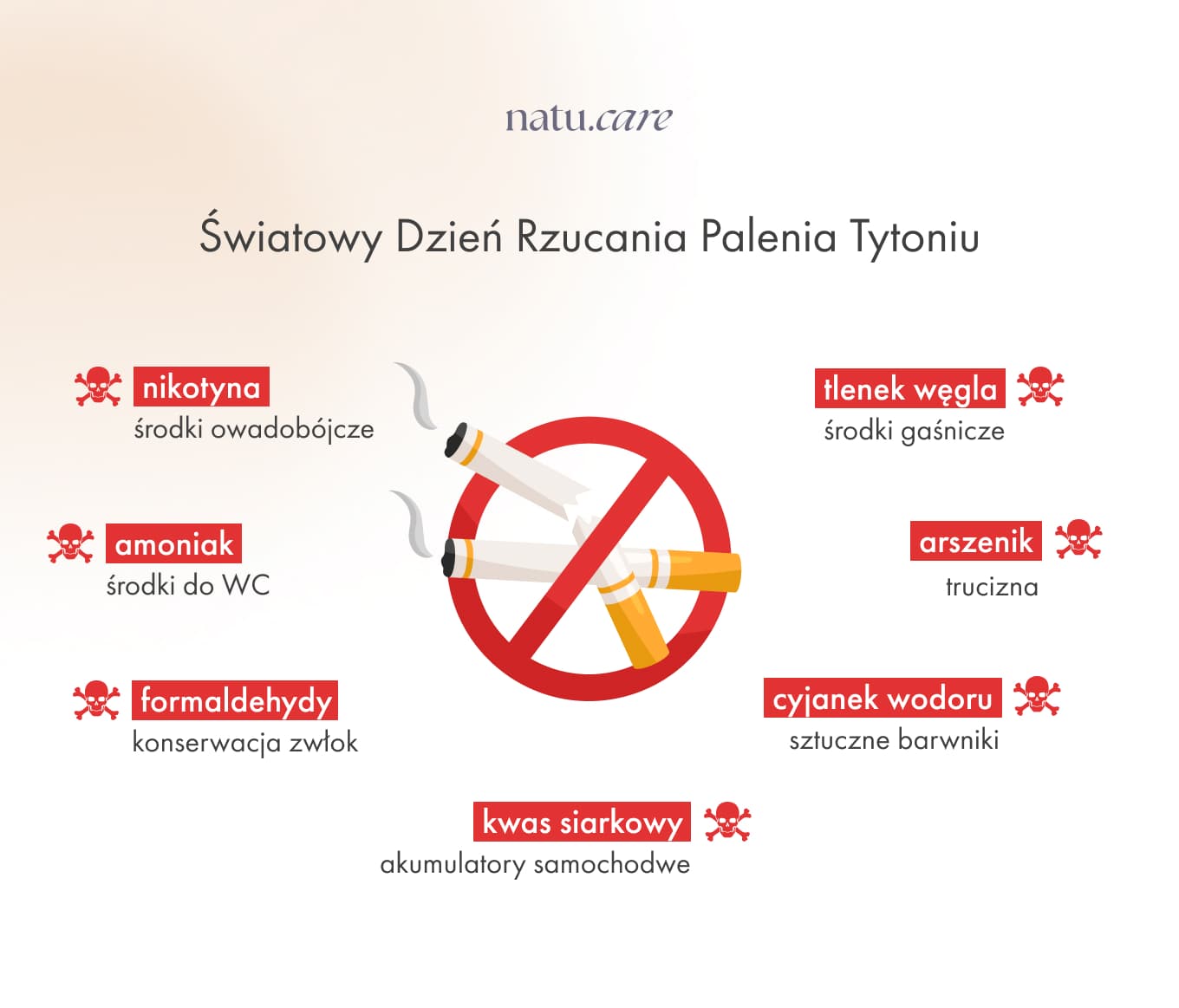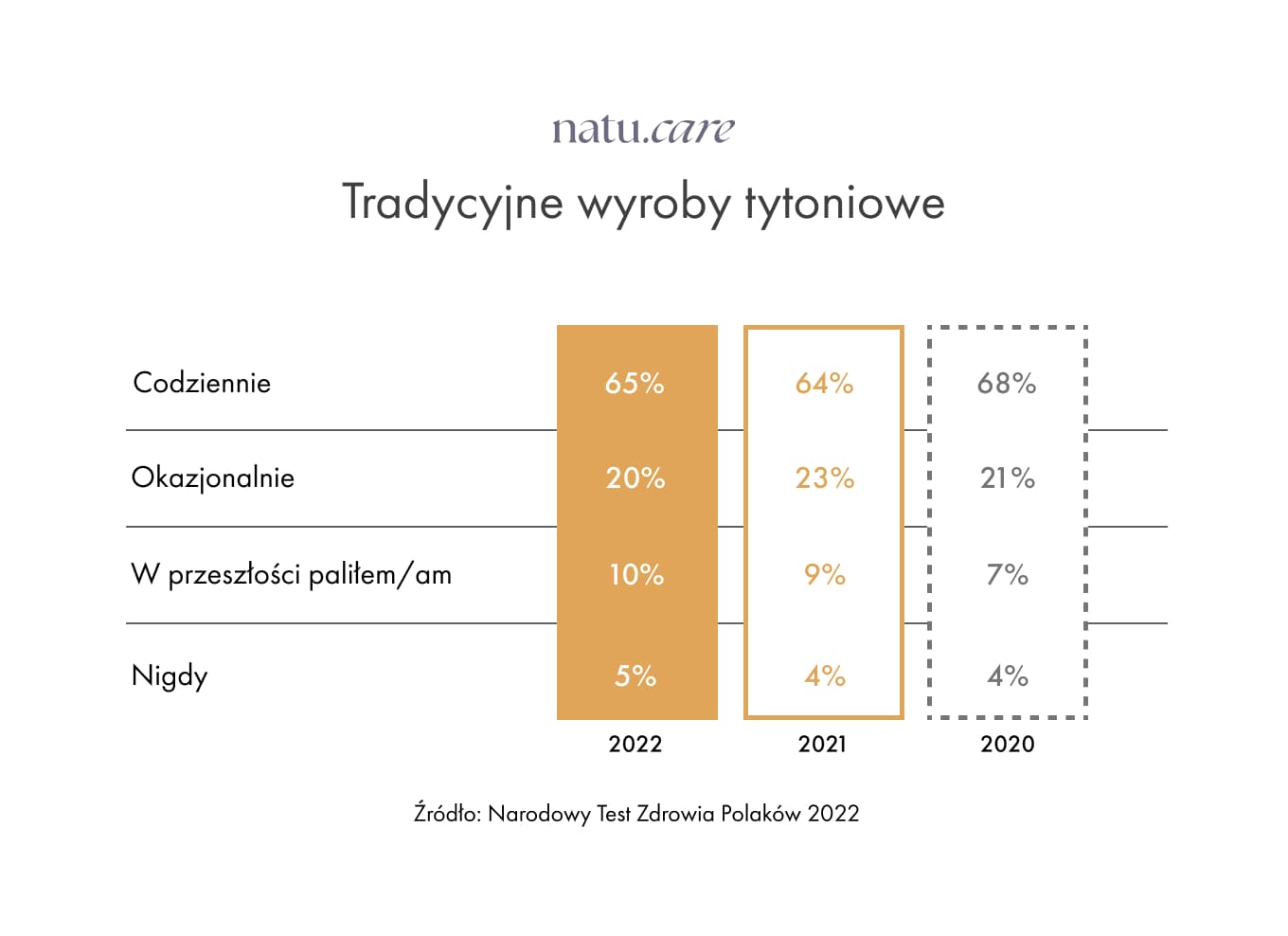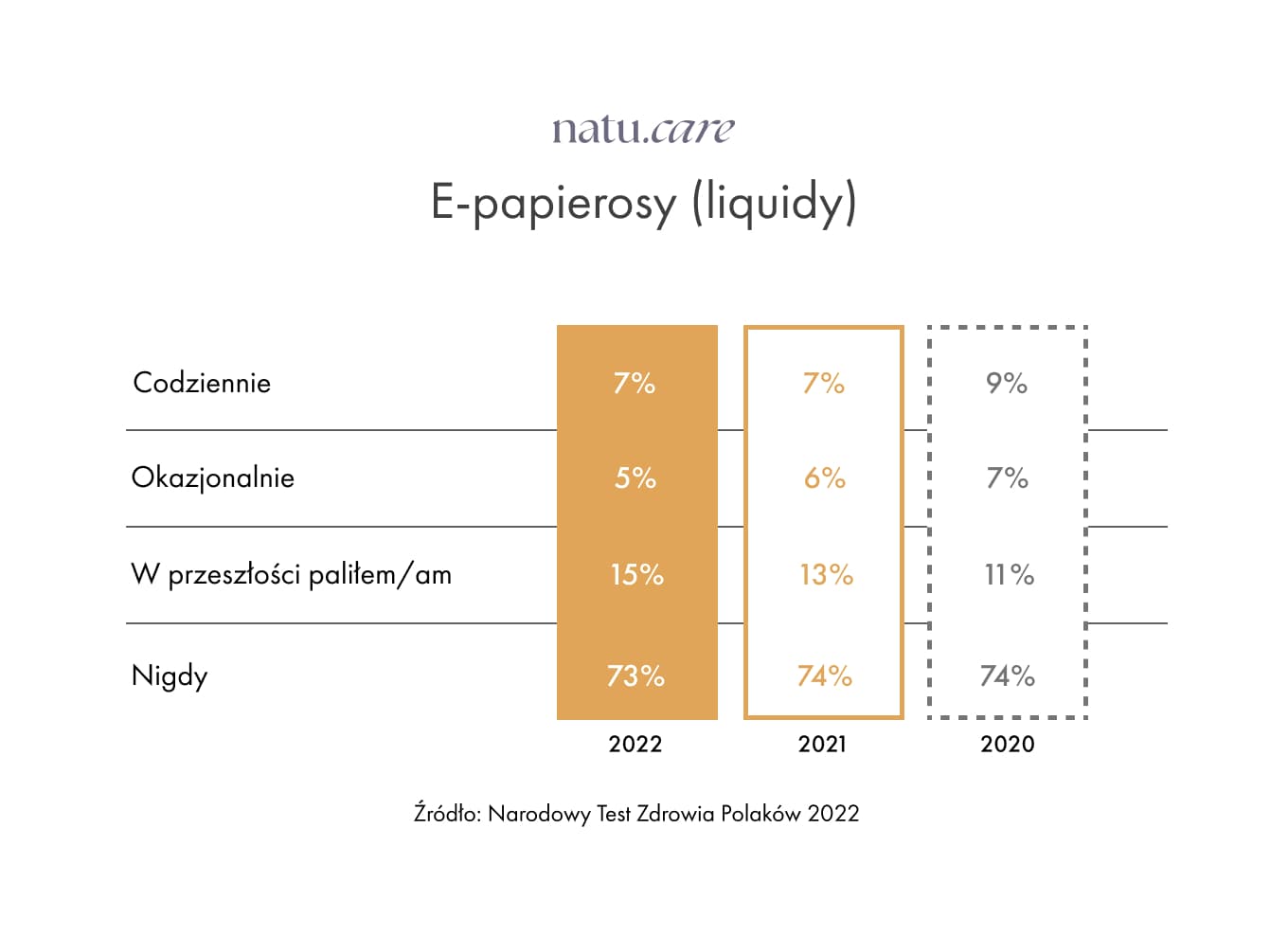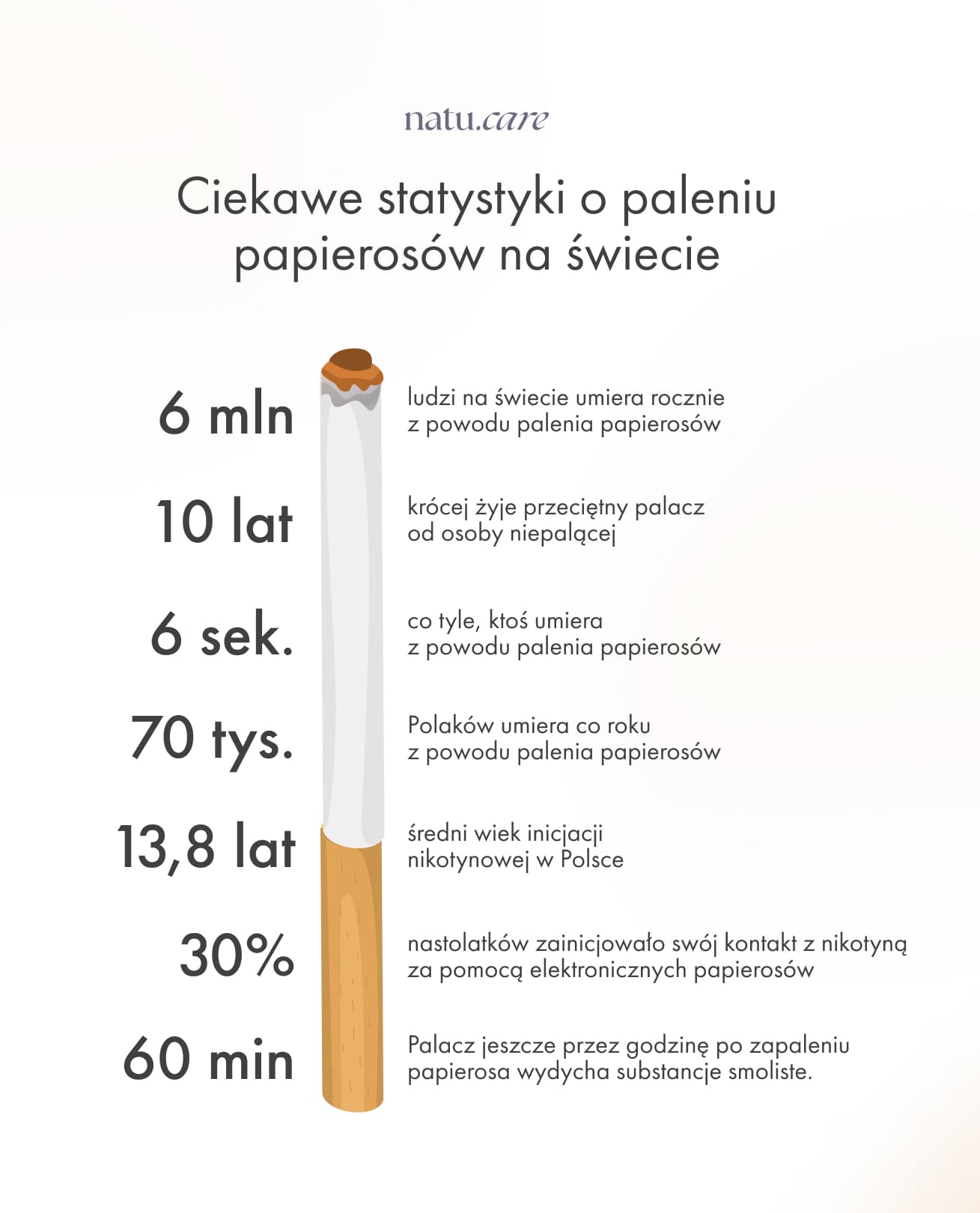World No Tobacco Day - Poles make smoke
How about ending your toxic relationship with nicotine just today?


Learn more about our editorial process
.

Learn more about our editorial process
.

Learn more about our editorial process
.

Learn more about our editorial process
.
Why you can trust us
Articles on Natu.Care are written based on scientific research, data from government websites and other reliable sources. The texts are written in cooperation with doctors, nutritionists and other health and beauty experts. Articles are reviewed before publication and during significant updates.
.Learn more about our editorial process
.Information about advertisements
Content on Natu.Care may contain links to products from the sale of which we may receive a commission. When creating content, we adhere to high editorial standards and take care to be objective about the products discussed. The presence of affiliate links is not dictated by our partners, and we select the products we review ourselves completely independently.
.Learn more about our terms and Conditions
.You know the meme where a man was buying cigarettes and the salesman asked him which packet he wanted - impotence or heart attack? The smoker was relieved he chose the heart attack. And every day up to 8 million Poles choose.
You surely know that smoking literally kills and you would be better off not smoking. More than once someone has been bitching to you (and you've been fuming inside) when you've heard for the hundredth time: well quit that smoking.
On World No Tobacco Quit Day, social media is flooded with graphics of salty lungs, calculations of how much a smoker would save after quitting and how many years shorter they will live. But after all You know it all...
.Since you know, then... why not quit smoking? Do it for yourself, your loved ones, even your dog and... your wallet. Together with the experts, I'll give you tips on how to get started, today.
Take a look at how to quit.
From this article you will learn:
- What, how much and where do Poles smoke.
- Who smokes the most?
- Who has the cleanest and who has the smokiest lungs in the world. .
- What benefits will quitting smoking give you.
- What are the benefits of quitting smoking?
- Will you actually buy yourself a Mercedes when you quit smoking.
- What are the benefits of quitting smoking?
- Why a colleague's grandmother smoked and lived 100 years.
- Why you should stop smoking.
See also:
- Lung health after the pandemic
- How to take care of your mental health .
- Food waste in Poland and around the world
- Clean Air Day
- National Kindergarten Day
- Bone Marrow Donor Day
- Great Bees Day
- Blood Donation Day
- Fish Day
- Of singles on Valentine's Day
World Tobacco Cessation Day
.In 1974, American journalist Lynn Smith appealed to readers of the Monticello Times newspaper to stop smoking cigarettes for one day. Three hundred people pledged to take up the challenge and Smith put their names on the front page of the newspaper. Three months later, 9% of those people reported that they had quit smokingand.
The journalist dubbed this day D-Day ( Don't Smoke Day). Two years later, the American Cancer Society introduced the day nationwide, and it is now celebrated globally every year on the third Thursday in November as World No Tobacco Dayand.
Poland wants to quit.
People want to quit smoking, but don't quite know how to do it effectively. World No Tobacco Quit Day is a good excuse to fight the habit. It does not mean that you have to quit smoking on that day. Just considering and thinking about it is a success.
Smoking? Consider ending a toxic relationship with nicotine. Someone close to you smokes? Send him or her this article. Let's lower the statistics of smokers in Poland together.
The cigarette - a buddy with a nasty inside
.I like the ad for a smoking cessation drug. A huge, obtrusive and ugly cigarette follows a man around all day. That's how I imagine this addiction.
Maybe you just ignore this guy on a daily basis, but I know how people who try to break it suffer. Several times. And he keeps coming back, tempting you, telling you that you need him and giving you relief. But he's a liar with a nasty inside. Do you know what it consists of?
The cigarette contains around 7,000 compoundsand that are harmful to your health. And 70 of these cause cancerand.
Carcinogenic compounds include, among others:
.- nicotine, .
- ammonia, .
- arsenic, .
- tarsenic substances, .
- carbon monoxide, .
- formaldehydes, .
- nitrogen oxides, .
- hydrogen cyanide, .
- sulphuric acid, .
These compounds can be found in many productsand.
.
Think of these ingredients when you're chasing a fly with Raid in hand or washing the toilet.
.Natu.Care Collagen Premium 5000 mg, mango & passion fruit

- Collagen content: 5000 mg marine collagen hydrolysate
- Additional active ingredients: vitamin C, low molecular weight hyaluronic acid (and L-theanine and coenzyme Q10 in cocoa flavoured collagen or vitamin A and vitamin E in mango–passion fruit flavoured collagen)
- Form: powder sachets
- Dose: 1 sachet per day
- Sufficient for: 30 days
Product description
Fish collagen from the Natu.Care brand in a dose of 5000 mg, based on certified ingredients of the best quality. Regular supplementation will positively influence the appearance of the skinóry, hairów and nails – they will be rebuilt and strengthened from the inside.
In addition to collagen, which is valuable for health and beauty, it also offers other active ingredients that help to maintain a youthful complexion, shiny hair and strong nails.
The formula contains a sufficient portion of the active ingredient to positively affect joints, the musculoskeletal system and immunity.
Natu.Care Premium Collagen is available in two flavours – Cacao Bloom and Rise&Shine. Both formulas are based on the following active ingredients: marine collagen hydrolysate, wild roseóbud extract and hyaluronic acid.
Additionally, Cacao Bloom contains natural L-theanine, coenzyme Q10 and defatted Dutch cacao. Rise&Shine instead contains vitamin E and vitamin A.
These are the best collagens in the world.
These best fish collagens on the market also rós taste – Cacao Bloom is a treat for chocolate lovers. Rise&Shine will appeal to those whoólike the refreshing taste of mangoófruit and passion fruit.
Pros and cons
Pros:
- Vitamin C supports the body's collagen production, enhancing its effectiveness.
- An effective dose of hyaluronic acid, which additionally supports skin hydration and joint health.
- Fish collagen absorbs 50% better. Additionally, the manufacturer specifies the fish species it is sourced from (Atlantic cod).
- The composition has been tested by the independent and accredited J.S. Hamilton laboratory.
- MSC (Marine Stewardship Council) quality certification, which confirms that the collagen source supports sustainable fishing practices.
Cons:
- None.
Additional information
Natu.Care's fish collagen receives praise for its delicious taste. You won't find the fishy aftertaste that often comes through in other collagens. Plus, you have two tasty flavors to choose from: cocoa and mango-passionfruit.
Active ingredients like coenzyme Q10, hyaluronic acid, and natural L-theanine provide anti-inflammatory and antioxidant benefits while slowing down aging processes.
User review
Super, after about 6 weeks of use, the skin on my face became noticeably firmer. Wonderful taste.
Ania ZalewskaNatu.Care customer
Natu.Care Premium collagen 10 000 mg, mango-maracuja

- Collagen content: 10,000 mg marine collagen hydrolysate
- Additional active ingredients: vitamin C, low molecular weight hyaluronic acid (and L-theanine and coenzyme Q10 in cocoa flavoured collagen or vitamin A and vitamin E in mango–passion fruit flavoured collagen)
- Form: powder sachets
- Dose: 1 sachet per day
- Sufficient for: 30 days
Product description
One of the strongest collagens on the market, whichós provides as much as 10,000 mg in a daily serving. This allows the formula to effectively support the condition of the skin, hair and nails.
With this supplement, you will support your beauty, which will allow you to visually stop the ageing process and feel a second youth!
Natu.Care Collagen Premium 10 000 mg comes in two flavours – cherry and mango-maracuja. Both formulas have the same product backbone – collagen, hyaluronic acid and vitamin C.
In the cherry version you additionally find glucosamine, chondroitin and Indian frankincense resin extract. Mango-maracuja, on the other hand, contains vitamin E and vitamin A.
Pros and cons
Pros:
- Tested collagen formula – SeaGarden, whose effects have been confirmed in clinical studies.
- Effective dose of hyaluronic acid, additionally moisturizing the skin and positively impacting joint health.
- Vitamin C supports the body’s natural collagen production.
- The composition has been tested by the independent and accredited J.S. Hamilton laboratory.
- The product has an MSC (Marine Stewardship Council) quality certification – the collagen source supports sustainable fishing practices.
Cons:
- None.
Additional information
Users praise Natu.Care Collagen Premium for the easy dissolvability of the powder.
User review
I noticed a significant improvement in my skin texture after a few weeks of taking collagen regularly. My complexion is now as soft as velvet!
Natu.Care Collagen Premium 10000 mg, cherry

- Collagen content: 10,000 mg of hydrolyzed bovine collagen
- Additional active ingredients: vitamin C, low molecular weight hyaluronic acid, glucosamine, chondroitin, extract of Indian frankincense resin (boswellia serrata)
- Form: powder sachets for drinking
- Serving: 1 sachet per day
- Lasts for: 30 days
Product description
One of the strongest collagens on the market, providing as much as 10,000 mg per daily serving. This product can effectively support the condition of joints, skin, hair, and nails.
With this supplement, you will support your skeletal and joint system as well as your beauty, helping you visually halt the aging process and feel rejuvenated!
Pros and cons
Pros:
- The daily portion of collagen is very large – as much as 10,000 mg.
- Proven collagen formula – COLLinstant, whose effectiveness has been confirmed in clinical studies.
- Effective dose of hyaluronic acid, which additionally moisturizes the skin and positively affects joint health.
- Vitamin C supports the body's natural collagen production.
- Glucosamine is a fundamental building block of compounds found in joint cartilage and a component of collagen that gives elasticity to connective tissue in tendons.
- Chondroitin is a natural component found in the human body, mainly in cartilage. This large molecule (mucopolysaccharide) has the ability to absorb water, which helps maintain the elasticity and resilience of cartilage.
- Frankincense resin extract supports blood circulation and joint mobility and reduces their stiffness. It may help alleviate inflammatory conditions.
- The composition has been tested by the independent and accredited J.S. Hamilton laboratory.
Cons:
- None.
Additional information
Users praise Natu.Care Collagen Premium for the easy dissolving of the powder.
Premium Sodium Butyrate
Product description
Premium Sodium Butyrate is a natural support for your digestive system. With a high dose of butyric acid (940 mg), it supports the regeneration of the intestinal mucosa, improving gut health and function, and aids in the absorption of nutrients. By taking care of your intestines, you're taking care of the health of your entire body.
Studies involving people suffering from irritable bowel syndrome confirm that sodium butyrate is ideal for supporting issues related to bacterial flora imbalances (for example, after antibiotic therapy), constipation and diarrhea, inflammation of the intestinal mucosa, or a diet low in fiber.
Premium Sodium Butyrate capsules are made using the innovative DRcaps® technology. This guarantees that the active ingredients in the product are protected from the destructive effects of stomach acids and digestive enzymes. As a result, we can be sure that the beneficial ingredients are released in the small intestine and are fully absorbed by our body.
Premium Sodium Butyrate from Natu Care is 100% tested, and its composition contains only the highest quality raw materials.
Pros and cons
Pros:
- Supports digestive system function
- Helpful for various gastrointestinal conditions, including IBS
- High dose of butyric acid in each capsule
- Eco-friendly, clean, and tested composition
- Free from added sugar, gluten, GMOs, and lactose
- Innovative capsule technology - DRcaps
Cons:
- None
Additional Information
Take 3 capsules daily at any time of the day, preferably with a meal. Swallow the capsules whole with water.
Premium Sodium Butyrate is intended for adults.
The product should be used under medical supervision.
User review
I've been using the product for 2 weeks. My stomach feels lighter, and my digestion has improved. I recommend it.
Natu.Care Premium Magnesium + Vitamin B6

- Magnesium content per day: 305 mg
- Additional active ingredients: Vitamin B6 (2.1 mg)
- Form: capsules
- Serving size: 3 capsules per day
- Sufficient for: 30 days
Product description
The Premium Magnesium + Vitamin B6 dietary supplement is a comprehensive product that combines three organic forms of magnesium (citrate, malate, and diglycinate) and vitamin B6 in highly absorbable forms.
Magnesium is an essential mineral without which our bodies cannot function properly. It supports the immune, nervous, and muscular systems, maintains electrolyte balance, and is involved in cell division and the regulation of mental functions.
Research shows that magnesium supplementation is even more effective when accompanied by vitamin B6, which is included in our product. Vitamin B6 is responsible for the proper functioning of the nervous and immune systems, as well as the proper functioning of the heart.
If you want to safely get rid of feelings of fatigue, concentration problems, hair loss, muscle cramps, trembling, or irritability, reach for Premium Magnesium from Natu.Care, tested by the independent, certified laboratory J.S. Hamilton Poland.
Pros and cons
Pros
- Supports the proper functioning of the nervous and immune systems.
- Reduces feelings of fatigue and tiredness.
- Maintains proper psychological functions.
- The purity of the ingredients (free from anti-caking agents, artificial fillers, and additives such as titanium dioxide, microcrystalline cellulose, talc, magnesium stearate, and silicon dioxide) has been confirmed by laboratory tests.
- High absorption of ingredients.
- Soft capsules that are easy to swallow.
- Suitable for vegetarians and vegans.
Cons
- None.
Additional information
Take with a meal, 3 capsules per day.
The capsules should be taken with at least 250 ml of water.
If you have trouble sleeping, it is advisable to take 1 capsule in the morning and 2 capsules in the evening, no later than 4 hours before bedtime.
Avoid combining with products high in calcium (milk, yogurt, cheese), as this may negatively affect magnesium absorption.
Pregnant and breastfeeding women should consult a doctor before starting supplementation.
User review
I’m very impressed with the speed of delivery. The product itself is of high quality and absorbs well. After two weeks of supplementation, I’ve noticed a significant improvement in muscle recovery, especially during periods of intense training. I highly recommend it!
Product description
The dietary supplement contains omega-3ᵀᴳ, or omega-3 acids in the form of trójglyceridesów. Scientific studies suggest that this form of fatty acidsós up to 2 times better absorbed than the estersós present in many dietary supplements on the market. This means that you are assured of their effectiveness and of supplying yourself with valuable omega acids.
Fatty acids omega-3 are derived from wild anchovy oil. It is a rich source of healthy fats that are essential for the health of the cardiovascular, immune and nervous systems, as well as the proper function of vision, joints muscles.
Scientific research suggests that wild anchovies are a good source of healthy fats.
Scientific research also suggests that an adequate intake of omega-3 fatty acidsós protects against and supports the treatment of depression and anxiety disorders. In addition, omega-3s influence the hydration and appearance of the skinóry and support healthy sleep.
.
The formula contains a total of 750 mg of EPA+DHA acidsós, which is three times higher than the recommended minimum of 250 mg for the Polish population. Omega-3 TG Premium has studies indicating that its TOTOX is 9, which is a very good result.
Supplementation of omega-3 fatty acidsóis recommended for anyone who does not eat 1–2 portions (approximately 300 g) of oily fish per week. Children during growth, seniors, physically active people, vegans and vegetarians, as well as patients undergoing cardiovascular treatment and prevention of heart disease also have an increased need.
Pros and cons
The dietary supplement contains omega-3ᵀᴳ, or omega-3 acids in the form of trójglyceridesów. Scientific studies suggest that this form of fatty acidsós up to 2 times better absorbed than the estersós present in many dietary supplements on the market. This means that you are assured of their effectiveness and of supplying yourself with valuable omega acids.
Fatty acids omega-3 are derived from wild anchovy oil. It is a rich source of healthy fats that are essential for the health of the cardiovascular, immune and nervous systems, as well as the proper function of vision, joints muscles.
Scientific research suggests that wild anchovies are a good source of healthy fats.
Scientific research also suggests that an adequate intake of omega-3 fatty acidsós protects against and supports the treatment of depression and anxiety disorders. In addition, omega-3s influence the hydration and appearance of the skinóry and support healthy sleep.
.
The formula contains a total of 750 mg of EPA+DHA acidsós, which is three times higher than the recommended minimum of 250 mg for the Polish population. Omega-3 TG Premium has studies indicating that its TOTOX is 9, which is a very good result.
Supplementation of omega-3 fatty acidsóis recommended for anyone who does not eat 1–2 portions (approximately 300 g) of oily fish per week. Children during growth, seniors, physically active people, vegans and vegetarians, as well as patients undergoing cardiovascular treatment and prevention of heart disease also have an increased need.
Additional information
The dietary supplement contains omega-3ᵀᴳ, or omega-3 acids in the form of trójglyceridesów. Scientific studies suggest that this form of fatty acidsós up to 2 times better absorbed than the estersós present in many dietary supplements on the market. This means that you are assured of their effectiveness and of supplying yourself with valuable omega acids.
Fatty acids omega-3 are derived from wild anchovy oil. It is a rich source of healthy fats that are essential for the health of the cardiovascular, immune and nervous systems, as well as the proper function of vision, joints muscles.
Scientific research suggests that wild anchovies are a good source of healthy fats.
Scientific research also suggests that an adequate intake of omega-3 fatty acidsós protects against and supports the treatment of depression and anxiety disorders. In addition, omega-3s influence the hydration and appearance of the skinóry and support healthy sleep.
.
The formula contains a total of 750 mg of EPA+DHA acidsós, which is three times higher than the recommended minimum of 250 mg for the Polish population. Omega-3 TG Premium has studies indicating that its TOTOX is 9, which is a very good result.
Supplementation of omega-3 fatty acidsóis recommended for anyone who does not eat 1–2 portions (approximately 300 g) of oily fish per week. Children during growth, seniors, physically active people, vegans and vegetarians, as well as patients undergoing cardiovascular treatment and prevention of heart disease also have an increased need.
Expert opinion
The dietary supplement contains omega-3ᵀᴳ, or omega-3 acids in the form of trójglyceridesów. Scientific studies suggest that this form of fatty acidsós up to 2 times better absorbed than the estersós present in many dietary supplements on the market. This means that you are assured of their effectiveness and of supplying yourself with valuable omega acids.
Fatty acids omega-3 are derived from wild anchovy oil. It is a rich source of healthy fats that are essential for the health of the cardiovascular, immune and nervous systems, as well as the proper function of vision, joints muscles.
Scientific research suggests that wild anchovies are a good source of healthy fats.
Scientific research also suggests that an adequate intake of omega-3 fatty acidsós protects against and supports the treatment of depression and anxiety disorders. In addition, omega-3s influence the hydration and appearance of the skinóry and support healthy sleep.
.
The formula contains a total of 750 mg of EPA+DHA acidsós, which is three times higher than the recommended minimum of 250 mg for the Polish population. Omega-3 TG Premium has studies indicating that its TOTOX is 9, which is a very good result.
Supplementation of omega-3 fatty acidsóis recommended for anyone who does not eat 1–2 portions (approximately 300 g) of oily fish per week. Children during growth, seniors, physically active people, vegans and vegetarians, as well as patients undergoing cardiovascular treatment and prevention of heart disease also have an increased need.
Natu.Care Vitamin D 2000 UI
Product description
Vitamin D plays a crucial role in our health and well-being. It affects calcium and phosphate metabolism, which translates to healthy bones and teeth. It also helps regulate the immune system, and studies indicate its influence on the functioning of the nervous system.
Vitamin D, although called a “vitamin,” is actually a prohormone that our body produces on its own, primarily under the influence of sunlight. Unfortunately, our modern lifestyle contributes to deficiencies of this essential vitamin. Working in enclosed office buildings, using (necessary!) SPF creams, and covering the body with clothing all make it very difficult, if not impossible, to obtain adequate levels of vitamin D from sunlight. This is why appropriate, year-round supplementation is so crucial.
Vitamin D from Natu.Care is a well-tested vitamin D3 suspended in safflower oil, a plant known for its numerous health benefits. The convenient, easy-to-swallow capsule will make supplementation a part of your daily, healthy routine, improving your overall well-being.
Pros and cons
Pros:
- Ensures proper functioning of the immune system
- Supports the maintenance of healthy bones and teeth
- Maintains proper heart, kidney, and muscle function
- Tested by an independent, certified laboratory
- Convenient and easy-to-swallow capsule
- Clean composition - free from added sugar, gluten, GMOs, lactose, and without preservatives or colorants
Cons:
- None.
Additional Information
Pregnant women and breastfeeding mothers should consult a doctor before using the product. This dietary supplement is intended for a healthy adult population up to the age of 75.
Collagen Booster - Glow Stories

- Active ingredients: bamboo shoot extract, Quatrefolic®, L-Methionine, L-cysteine, vitamin E, vitamin A, niacin (vitamin B3), vitamin B6, vitamin B2 (riboflavin), biotin, zinc, copper
- .
- Form: capsules
- .
- Dose: 1 capsule per day
- .
- Sufficient for: 60 days
- .
Product description
A dietary supplement containing vitamins, minerals and plant extracts thatósupport the skinóhand, hair and nails. The product is especially distinguished by the form of folate – it is Quatrefolic, whichós absorbed very well and is natural.
In addition to valuable vitamins and minerals, such as vitamin A, E, B3, B2 and biotin, the formula contains bamboo shoot extract, whichóry further enhances your beauty.
Pros and cons
A dietary supplement containing vitamins, minerals and plant extracts thatósupport the skinóhand, hair and nails. The product is especially distinguished by the form of folate – it is Quatrefolic, whichós absorbed very well and is natural.
In addition to valuable vitamins and minerals, such as vitamin A, E, B3, B2 and biotin, the formula contains bamboo shoot extract, whichóry further enhances your beauty.
Additional information
A dietary supplement containing vitamins, minerals and plant extracts thatósupport the skinóhand, hair and nails. The product is especially distinguished by the form of folate – it is Quatrefolic, whichós absorbed very well and is natural.
In addition to valuable vitamins and minerals, such as vitamin A, E, B3, B2 and biotin, the formula contains bamboo shoot extract, whichóry further enhances your beauty.
How Poles smoke and why they smoke so much
.I have good news and bad news: Poles are trying more and more to quit smoking, but they continue to smoke a lot.
I have looked at a lot of statistical data and everywhere we rank high in smoking. According to a CBOS survey and a report by the World Health Organisation (WHO), regular smoking is declared by one in four adults, which means there are almost 8 million smokers in Polandand.
Who are Polish smokers?
.According to the latest data from CBOS and Poland's 2022 National Health Survey, which involved 230,000 respondents, it appears thatand:
- the proportion of active smokers of all tobacco products averages 30%, .
- 22% are classified as compulsive smokers and 8% use tobacco products occasionally, .
- only one in nine smokers would like to quit, .
- 21% of women and 24% of men are compulsive smokers, .
- most smokers are aged 40-49, .
- there are almost 3 times more compulsive smokers among those with primary and vocational education (34%) than those with tertiary education (13%), .
- the highest number of compulsive smokers is in Warmia and Mazury - 27%, .
- least (but still a lot) people smoke in Podkarpacie - 19%, .
- in the Małopolska province, as many as 48% of respondents have never smoked. .

Let's take a magnifying glass and look in each province (in some it can be difficult because smoke obscures).
See below for detailed data on tobacco smoking by region in Poland.
.|
Voivodeship . |
Number of people declaring themselves to be compulsive smokers |
|
Warmińsko-mazurskie |
27% |
|
Western Pomeranian |
26% |
|
lubuskie |
25% |
|
Dolnośląskie, Kujawsko-Pomorskie, Pomorskie |
24% |
|
Podlaskie, Lubelskie | |
| . |
23% |
|
łódzkie, mazowieckie, opolskie, śląskie, świętokrzyskie |
22% |
|
Wielkopolskie |
21% |
|
Malopolska |
20% |
|
subcarpathian |
19% |
Oh, irony
Warmia and Masuria are famous as the "green lungs of Poland". Unfortunately, this province has the highest mortality from lung diseasesand. It has also seen a rapid increase in lung cancer deaths in women over the past two decadesand.
Smoking tobacco products is a very 'social habit'. Some people smoke for company, and wouldn't do it if someone didn't suggest it to them. We smoke at work to have an excuse to go out or listen to the latest gossip, or at a party to better find ourselves in a group, rather than sitting alone at a table waiting for others to come back.
We sometimes find it hard to say no to a cigarette because it is related to a habit, i.e. a place, a situation, a smell that reminds us of a certain state, and we want to smoke again and feel what we felt before..
 .
.
Jagoda TurowskaPsychologist and social skills trainer
Smoker on the couch
.Research suggests there are two distinctive groups of tobacco smokers - they are extroverts and neurotics. A study in Poland found that tobacco-dependent individuals with both extrovert and neurotic characteristics had higher levels of psychological distressand.
In the study Reduction of cigarette smoking and e-cigarette use, particularly among the younger generation of Poles prepared by experts of the National Academy of Sciences, we can read that as many as 28.8% of adult Poles (30.8% of men and 27.1% of women) admitted to daily smoking in 2022, and this result has an increasing trend with respect to previous years.
.Interestingly, in this survey, compulsive smokers outnumber those describing their financial situation as bad (25%), and the highest number of smokers is among the unemployed (34%) and housewives (39%).
.How many cigarettes a day do we smoke?
.The average Pole smokes 16 cigarettes a dayand. This is quite a lot - more than the EU average of 13.7 cigarettes. Further down the road, warmers are popular and e-cigarettes are growing in popularity.
What do Poles smoke?
.Polish people smoke in a variety of ways: from classics, i.e. regular cigarettes, through heated tobacco to inventions -as one grandfather said for e-cigarettes. The graphics below show what and how often Poles have smoked over the past three years.



The preference for smoking choice among Poles is interesting. From year to year the popularity of e-cigarettes is increasing, especially among young people, but old smokers stay with the classic cigarette.
It is worth noting that the NTZ data was collected from people over the age of 18, but we do, after all, see plenty of younger smokers people every day.

E-cigarettes have unduly received a reputation for being 'safer' than regular cigarettes. It is a further harmful and physically and mentally addictive form of smoking..
 .
.
Ilona Krzak Master of Pharmacy
Fight against smoking
.There is positive - compulsive smokers are trying to break the toxic relationship with tobacco:
- Among active smokers, as many as 56% (up 2 p.p. from 2021) have tried to quit but were unsuccessful, .
- 23% have not yet tried to quit, but plan to do so in the future, .
- 21% of active smokers (23% of women and 19% of men) have never tried to quit and do not plan to do so in the future (up 1 pp from 2021).
Smokers in Europe
.According to 2019 Eurostat data, tobacco products are smoked 19.7% of European adultsand. Bulgarians (28.2%), Turks (27.3%) and Greeks (27.2%) make smoke on the podium in Europe. Poland ranks 11th in these figures (22.7% of smokers). In contrast, the Swedes (9.3%), Icelanders (11.2%) and Finns (12.5%) have the cleanest lungs.
.Swedes are struggling
.Sweden, the European country with the lowest smoking rate, has been fighting cigarettes for years. In early 2005, smoking was banned in all bars and restaurants. In 2019, the ban was extended to include outdoor seating in bars and restaurants, as well as in public placesand.
On the old continent, more men than women smoke -regular smoking is reported by an average of 22.3% in European men and 14.8% in European women. Interestingly, however, there are countries with the opposite trend - there are more female smokers than male smokers in Sweden, Denmark and Norway.
.The countries that vape (use e-cigarettes) the most among EU member states are France (6.6%), Poland (6.0%) and the Netherlands (5.9%), including occasional and daily vaping. The Spanish (1%) and Turks (0.9%) use e-cigarettes the least.
.And how do they smoke overseas?
.Exhaustive data on tobacco smoking was published in 2021 by the US CDC (Centers for Disease Control and Prevention), an agency of the US federal government that is part of the Department of Health and Human Servicesand.
Americans are successfully quitting smoking year after year. From 20.9% of adult smokers in 2005, in 2021 there are only 11.5% -that's 9.4% fewer US citizens. Addicts include 13.1% of men and 10.1% of women.
.Most smokers are in the 45-64 age group (14.9%) and the least in the 18-24 age group (5.3%). It is noteworthy that education in the US about the harms of smoking is at a high level, as is awareness of the addiction and its effects, which is why so few young people take up cigarettes.
The number of smokers in the US is high.
Where do you get in the US?"
If you were looking for smokers to hang out with in the US, you would find the most in West Virginia (25.2%) Kentucky (23.4%), Arkansas (22.7%). In contrast, you will be happy to put you out in Utah (9%), California (11.2%) and Washington (12%).
Nicotine crown for...
.Where do they smoke the most? The island micro-state of Nauru in the Pacific Ocean has the highest smoking rate in the world. As many as 52.10% of the population are compulsive smokers with a population of just over 12,000 peopleand.
The next places on the podium are Kiribati with 52%, Tuvalu with 48.7%, Myanmar 45.5% and Chile 44.7%. You already know where to fly when you're sick of hearing: no quit that smoking!
Why do we smoke?
.Many smokers say they smoke cigarettes because:
- they enjoy it, .
- smoking relaxes them, .
- they get used to it, it's a reflex, .
- they want to de-stress, .
- it helps them to concentrate, .
- it's an excuse to get to know someone, to talk, .
- all their friends smoke and they don't want to break out, .
- they can't stop, .
It seems that smokers involve themselves for a variety of reasons - consciously and unconsciously. I asked the opinion of psychologists Matthew Nesterok and Jagoda Turowska.
In the case of cigarette smoking addiction, we can deal with 3 mechanisms of addiction. They are exactly the same as those that govern many other addictions, namely: the mechanism of illusion and denial, the mechanism of the distracted and split self, and the mechanism of compulsive regulation of feelings and emotions," explains psychologist Mateusz Nesterok.
.
Addicted people very often use cigarettes as a defence mechanism against stress or unpleasant emotions. Lighting a cigarette can give them the illusory feeling that nicotine is perfect for dealing with mental tension..
 .
.
Matthew Nesterokpsychologist
Smoking is a combination of psychological addiction and exposure to an addictive substance - nicotine. It is a psychoactive substance that affects brain function, arousal and invigoration, and an increase in blood pressure, which is associated with the release of dopamine.
 .
.
Jagoda TurowskaPsychologist and social skills trainer
Interesting statistics about cigarette smoking worldwide
.
E-cigarette - popcorn in the lungs
.It doesn't smell and has a sleek design - an innocent alternative & game-changer for the lungs?
Poland is in the top three countries that use e-cigarettesand. Interestingly, the highest number of vaping users is found among 18-24 year olds (and unofficially, under-18s).
The e-cigarette (vape) is an electronic device that aims to simulate smoking a traditional cigarette. Its operation is based on the heating of the inhalation fluid, resulting in the production of vapour, which is transmitted to the respiratory system via a mouthpiece. Such a system results in less toxic substances being delivered to the body than with traditional cigarettes.
The inhaled aerosol irritates the airways, often leading to pneumonia - this is known as popcorn lungs, or overgrowth alveolitis. The e-cigarette is considered an alternative to traditional smoking, but the long-term effects of its use are still being studied..
 .
.
Ilona Krzak Master of Pharmacy
A study conducted by researchers at the University of Southern California found that e-cigarette smoke contains 10 times less dangerous substances than smoke from traditional cigarettes. Unfortunately, there are four times more harmful metals in e-cigarette smoke than in traditional cigarette smokeand.
What substances can be found in e-cigarette smoke?
.- acetaldehyde, .
- cadmium, .
- isoprene, .
- nickel, .
- n-nitrosornicotin, .
- benzene, .
- formaldehyde, .
- lead, .
- nicotine, .
- toluene, .
Control of e-cigarette liquids is poor. Inhalation is one of the best methods of drug delivery. The lungs, as a highly circulated organ, allow substances to be quickly absorbed into the bloodstream. Therefore, any impurities in the liquid are absorbed together with the aerosol..
 .
.
Ilona Krzak Master of Pharmacy
E-cigarettes, compared to traditional cigarettes, do not cause yellowing of teeth and bad breath and do not damage your skin, hair and nails as much, but they still expose you to all the negative health effects you will read about below.
There is something to die for
.Such words I once heard from the mouth of a smoker. When it comes to compulsive smoking, there is a something to die for. Unfortunately, you don't have a choice like in the meme mentioned at the beginning - you don't know what you will or what you will die from.
Most dangerous consequences of smokingand:
- incidence of malignant tumours (e.g. lung, larynx, mouth and throat, bladder, pancreas, cervix), .
- increased risk of cardiovascular disease (e.g. myocardial infarction, ischaemic disease, stroke, atherosclerosis), .
- respiratory diseases (e.g. bronchial asthma, chronic obstructive pulmonary disease), .
- disorders of pregnancy (e.g. miscarriage, low birth weight of newborns), .
In addition, smoking causesand:
- yellowing of teeth, bad breath, faster tartar build-up, tooth decay, .
- impairment of the senses of taste and smell, .
- stomach and duodenal ulcers, intestinal hernias, heartburn, .
- eye diseases e.g. cataracts, visual impairment, macular degeneration, .
- infertility, impotence, .
- acceleration of skin ageing, wrinkles, increased acne, destruction of collagen in the body, .
- deficiencies vitamins and minerals (calcium, selenium, vitamin D).
The consequences of a smoker's habit are paid for by all Poles, the treatment of, among other things, COPD (chronic obstructive pulmonary disease) is reimbursed from the state budget. And on top of that... we are all around us being poisoned as passive smokers..
 .
.
Ilona Krzak Master of Pharmacy
A review of studies from 2023 suggests that young tobacco smokers and e-cigarette users are 7 times more likely to infect with coronavirusand.
Experts from the National Academy of Sciences point out that smoking is the most common cause of death of Polish men (26.6% of all deaths in 2019) and the second most common cause of death for women in Poland (13.7% of all deaths in 2019)and.
According to Global Burden of Disease estimates, smoking contributed to 83,000 deaths in Poland (including 56,000 among men and 27,000 among women) .
Cigarettes are destroying your mind
.A 2014 meta-analysis found that smokers have a 1.85-fold increased risk of depression, a 1.71-fold increased risk of anxiety syndromes and a 1.69-fold increased risk of psychological distress. Former smokers also had higher risk indicatorsand.
Don't kill me - or about passive smoking
.Balcony smokers, colleagues at a party, and sometimes unfortunately... a pregnant woman - they all expose other people to harmful cigarette smoke.
.Passive smoking is as dangerous to health as active smoking. Tobacco smoke from a cigarette smoked by another person in the same room contains 5 to 15 times more carbon monoxide and 2 to 20 times more nicotine than smoke inhaled by smokersand.
Passive smoking is very harmful because :
.- It increases the risk of lung cancer and respiratory diseases - infections, inflammation, coughing attacks, asthma, chronic obstructive pulmonary disease (COPD).
- Even small amounts of passively inhaled tobacco smoke can have a negative effect on blood clotting, clot formation and the development of atherosclerosis.
- May cause up to 25% higher risk of heart disease. .
- Because of its highly allergenic effect, it can lead to mucosal irritation, redness and watering of the eyes.
- Negatively affects the appearance of the skin, nails and hair. .
- Decreases the efficiency of the mind, lowers concentration, and deteriorates memory. .
- Degrades sleep quality significantly and shortens the deep sleep phase. .
The negative consequences of passive smoking also affect pets. By smoking in front of them, you are also exposing them to diseases or deterioration of their sense of smell..
 .
.
Ilona Krzak Master of Pharmacy
When a fine plume of smoke smoulders from a cigarette, this is known as smoke sidestream. It is more harmful than the smoke the smoker inhalesand.
The lower combustion temperature than when a cigarette is inhaled results in up to several times more carbon monoxide and nicotine in the side stream of tobacco smoke than in the smoke exhaled by the smoker..
 .
.
Ilona Krzak Master of Pharmacy
Unconscious harm
.WHO estimates that 1.2 million premature deaths per year worldwide are linked to unconscious smokingand.
And my grandmother smoked and lived to be a hundred
.I'm sure you're familiar with this phrase in various 'age configurations'. It is simply a psychological defence mechanism. Such an explanation gives a sense of security for a while, and the person uttering the words simply... would like it that way too.
The argument about the grandmother who smoked and lived to be a hundred is an example of a defence mechanism called denial. It involves the rejection of facts that contradict our beliefs or wishes, and a form of rationalisation of our behaviour.
 .
.
Katarzyna Rutkowskapsychologist and psychotherapist, Supervisor of the Clinical Team at Mindgram
The smoker who uses the above argument may want to convince themselves or others that smoking is not harmful to health and that there is no point in quitting. The argument gives the smoker a false sense of reassurance and security, as smoking has a negative impact on our mental and physical health - adds the expert.
Why is it important to stop smoking?
.On one forum I read a woman who wrote that when she smoked she didn't feel bad, but when she quit, she experienced increasing energy, fewer infections over the year, an increase in libido. I didn't know what I was missing - she concluded. Well, and it turned out... her mother-in-law doesn't cook so badly after all, because taste has returned.
Maybe you also have it so that you don't feel bad (yet). However, think about how good you could feel, but through addiction - you can't. The smoke has literally obscured you from the benefits that clean lungs bring.
The smoke has literally obscured you from the benefits that clean lungs bring.
Sometimes... it comes by itself
.I was amused by a comment on YouTube under a video about the reasons why Poles smoke cigarettes: My uncle smoked for over 20 years and only quit because he didn't want to go to the shop. Now he hasn't smoked for 3 years.
.The body will thank you
.A mere 20 minutes after putting out a cigarette, your body stops choking. And if you manage to kick the habit for longer - every organ will thank you.
Cigarettes are the best way to quit.
What can you expect?
- after 20 minutes your blood pressure and heart rate normalize, .
- after 24 hours, the risk of acute myocardial infarction begins to decrease, .
- after 38 hours the senses of smell and taste begin to function better, .
- after 12 months, the risk of heart attack decreases by 50%, .
- after 5 years, the risk of cancer of the lungs, mouth, larynx, oesophagus decreases and the likelihood of stroke decreases, .
- after 10 years, the risk of ischaemic heart disease is similar to that of a non-smoker, .
- after 15 years, the risk of lung cancer is similar to that of a never-smoker, .

Give yourself a decade more
Smokers live an average of 10 years less than a non-smoker. Quitting smoking at age 40 can lead to regaining that lost timeand.
Scientific research shows that people who smoke cigarettes are significantly more susceptible to various diseases and infections, and cigarette smoke has a major impact on the proper functioning of the innate and acquired immune system..
Kacper Nihalani physician
The innate immune system reacts the same way to all diseases and infections, while the acquired system is a second line of defence that develops with age and exposure to pathogens in the environment. Cigarette smoking lowers tissue oxidation, which results in slower wound healing rates and therefore increases the risk of infections - adds doctor.
One-third of smokers diagnosed with cancer continue to smoke - perhaps because of the poorly emphasised disease-related benefits of quitting. Research suggests that quitting smoking at the time of diagnosis significantly prolongs survival..
 .
.
Ilona Krzak Master of Pharmacy
Burned money
.Even if you're moderately worried about cancer and have become immune to the pictures of smeared lungs on a packet of cigarettes, maybe you'll be tempted to quit by... saving money? Any motivation is good to "cut off" the so-called 11th finger.
Let's say you smoke a packet of cigarettes a day, which costs an average of £18. So weekly you spend 126 PLN, monthly 540 PLN and annually 6480 PLN. Let's go further: 3 years of smoking is 19,440 zlotys, 5 years is 32,400 zlotys, and a decade with cigarettes spares you as much as 64,800 zlotys.
Don't smoke a wagon a day? That's OK, fire up the (sic!) calculator and try to calculate how much you could save.
Take a look at the calculator.
Where's your Mercedes?
.You know that story where someone calculates to a smoker that if he didn't smoke he could buy a nice car? To which the smoker replies with a sassy smile: then where's your Mercedes? Let's not kid ourselves - not many people buy Mercs after quitting smoking, but surely putting money aside and seeing the amount in your bank account grow is motivating.
My friend of mine is a friend of mine.
My friend, although she didn't buy herself a car, put aside a nice sum for her dream holiday. Anne decided on her 29th birthday that she was quitting smoking. She had been smoking since she was a teenager, but she started to notice her bad skin condition, her poor health, and the prices of cosmetics to discourage this... reinforced the motivation.
She set up a special account into which she transferred £70 a week (the amount she spent on average on classic cigarettes). She tried NTZ (Nicotine Replacement Therapy) under the guidance of a doctor. After a year, she had 3,600 zloty in her account and presented herself with a nice trip for her birthday. And some nice toiletries.
You may say that this is not an impressive amount, but for Ania it was. She had a goal, motivation and was able to seal it with a nice touch. Thanks to her, two other people also quit smoking. This cannot be valued. Congratulations to Ania.
How to quit smoking? Expert advice
How do you quit smoking? Are we lowering the statistics for Poland?"
.If you want to:
- .
- improve your health, .
- improve your fitness and appearance, .
- stop exposing loved ones (and pets!) to second-hand smoke, .
- say goodbye to hoarseness and morning spitting up of secretions, .
- check whether your mother-in-law really cooks tastelessly, .
- save money, .
- achieve great success in life and prove to yourself, that you can - .
quit smoking. Where do we start?"
Fix what didn't work before
.Did you quit so successfully that after a few days the cigarette took hold of you again? Think about why that was. Maybe too fast, maybe too... drastic? Switching from a cigarette a day to chewing gum instead of a pipe will not be suitable for everyone.
It is difficult to change a habit. Do you only smoke in company, and don't actually enlist and reaching out for a cigarette is just an old habit? Or how about a morning coffee and a cigarette as an extra? Think about when you smoke and why. Being aware of the habit makes it easier to try to change it.
.Create a diary, write down your thoughts, take note of when you smoke, how much you smoke, why you smoke, what it gives you, when you have the biggest craving. It's already a step towards giving up the habit.
Smoke.
Designate day "0"
.You don't have to promise yourself right now that you won't smoke again. You can take more time to conscious smoking, which I wrote about above. Knowing your own habits will make it easier for you to choose 'that day' when you finally cut down or stop smoking.
It's important that especially the first week after '0' day is not fraught with situations that you know are conducive to smoking - boredom, a habit from work, a party. If you can't avoid them, just being aware of the situation - oh here I would smoke - will help.
Choose your method
.Smoking cessation is an individual issue, involving different strategies of action, such as:
.- step-by-step smoking cessation, .
- nicotine replacement therapy (NTZ), .
- meetings with a psychologist, .
- support group, .
- rewarding oneself for each week or month persevered (e.g. a gift for oneself purchased from money put aside that would have been spent on cigarettes), .
- seeking activities and hobbies to avoid boredom, .
- practicing natural methods to remove tension and stress (e.g. Schultz autogenic training, Jacobson relaxation method, yoga, acupressure mat).
Nicotine replacement therapy is a very popular and best-studied pharmacological treatment for tobacco dependence syndrome. NTZ involves the release into the bloodstream of therapeutic doses of nicotine, much lower than those contained in cigarettes, without tar, carbon monoxide or other harmful substancesand.
Nicotine tablets, patches or gums help to negate withdrawal symptoms and gradually reduce the body's need for the substance. Care should be taken with the correct dose and duration of use to feel the effects and to work on psychological dependence and habits..
 .
.
Ilona Krzak Master of Pharmacy
Does hypnosis help with smoking cessation?"
.A 2019 review of 14 scientific studies found no reliable evidence that hypnosis provides long-term benefits in smoking cessation. It found that studies that suggested hypnosis could help quit smoking were poorly designed and small in scaleand.
Hypnosis can help us quit smoking if we are determined to quit. It is a method that influences the subconscious of the smoker and changes their attitude towards cigarettes. Hypnosis can discourage smoking by evoking negative associations, emotions or sensations associated with tobacco smoke..
 .
.
Katarzyna Rutkowskapsychologist and psychotherapist, Clinical Team Supervisor at Mindgram
Hypnosis can also boost motivation, confidence and self-control so that the smoker does not reach for a cigarette in stressful, boring or social situations, adds the expert.
Persevere
.Quitting any addiction is a hard and complex process, during which you may have a drop in motivation, negative thoughts and stumbling blocks.
Maintain patience with yourself and don't be discouraged from trying to quit your addiction. Don't let yourself think it's a matter of mythical strong willpower. Some people can quit smoking overnight, but others need several attempts before they finally overcome their addiction..
 .
.
Matthew Nesterokpsychologist
If you feel that you cannot cope on your own, do not hesitate to seek the help of a psychologist. In some cases, pharmacological treatment in cooperation with a psychiatrist can also help - adds expert.
Support is invaluable and boosts motivation, so it is helpful to get help from a psychologist, a loved one, virtual or live support groups. Motivational phone apps to help you quit smoking also work well for some people.
A friend of mine, after many years of addiction, told me that when quitting smoking he would get twisted when he couldn't light up, and his fingers would look for something to hold on their own. There were days when he would crack and light up, but over time he saw the frequency of his seizures decrease.
If you light up a cigarette after some time of abstinence, it does not mean you have lost all your progress and have to start again. The important thing is not to see it as a failure, but as an opportunity to learn something about yourself and your addiction.
 .
.
Katarzyna Rutkowskapsychologist and psychotherapist, Supervisor of the Clinical Team at Mindgram
Don't give up!
.On one Facebook support group, I read advice from one lad who, whenever he was tempted to light up, imagined that then the big, ugly smug grin of joy, which motivated the author of the post to not give a *** about it. That is, I wasn't the only one who liked the ad with the mischievous cigarette.
Try to understand what made you light up and how you can avoid doing so in the future. Remind yourself of the reasons and benefits of quitting smoking. Find your own motivation, focusing on what you will gain from this choice. Create a list of benefits, starting with the ones that will happen today. Reward yourself for every step towards quitting smoking - adds psychologist Katarzyna Rutkowska.
Bioresonance for smoking?
.Bioresonance is a pseudo-scientific, unconventional method with no strong scientific evidence for the claimed effectsand. Advertisements for "bioresonance to quit smoking" sound tempting, but your money... will go up in smoke.
Where to look for help?
.Want to stop smoking and need support? Get local help, guides or telephone advice dedicated to smokers.
- Telephone Smoking Help Point (TPPP) 801 108 108, Monday-Friday: 09:00 -21:00, Saturday: 09:00-15:00.
- Local advice service dedicated to smokers.
- Local anti-smoking clinics, Smoking Cessation Clinics in your area, usually at medical facilities, private or NFZ. .
- Service Ministry of Health and National Health Fund
- Informator about free smoking tests
- The National Center for Nutrition Education guide on nutrition and physical activity during and after quitting smoking
Europe has a purpose
One of the major goals of the European Cancer Plan is to create Tobaccofree Generation, a tobacco-free generation. By 2040, less than 5% of the EU population is expected to use it (currently around 25%)and.
Summary
.- Every year on the third Thursday of November, World No Tobacco Day is celebrated.
- World Tobacco Cessation Day is observed.
- Cigarettes contain approximately 7,000 compounds that are harmful to health, and 70 of these cause cancer, .
- Carcinogenic compounds include nicotine, which is used in insecticides, ammonia, which is an ingredient in toilet cleaners, and arsenic, a poison.
- There are also about 1,000 compounds that cause cancer.
- There are approximately 8 million smokers in Poland. .
- Polish women smoke slightly less than Polish men (21% vs 24%).
- Polish women smoke slightly less than Polish men (21% vs 24%).
- Most smokers are in the 40-49 age group.
- Most smokers are in the 40-49 age group.
- The cleanest lungs in Europe are those of Swedes, Icelanders and Finns. .
- E-cigarette is not at all a safe alternative to smoking classic cigarettes, it also puts the smoker at risk of cancer and other diseases.
- If you are properly motivated, you can successfully quit smoking. Match the method and the timing to quit gradually, not abruptly.
FAQ
.How many years does the average smoker live?
.It is impossible to say exactly how long the average smoker lives, as this is an individual matter depending on overall health, past illnesses and predispositions. However, we know from research and scientific studies that smokers live about 10 years shorter on average than non-smokers.
Why does one gain weight after quitting smoking?
.Reasons for weight gain after quitting smoking may include: slowed metabolism after nicotine withdrawal, lack of exercise and physical activity, increased hunger and snacking or snacking intoxication. Not everyone will gain weight after quitting smoking and this can be reduced by implementing physical activity and a suitable diet rich in fibre and nutrients.
How to avoid weight gain when quitting smoking
.To avoid weight gain when quitting smoking, make sure to implement physical activity or increase exercise during the day and keep an eye on the kcal supply of your diet. Activity will ensure that your metabolism works properly and kcal are burned, while a nutritious diet rich in fibre, vitamins and minerals will saturate your body and also prevent snacking.
It is worth consulting a dietitian if you are unsure how many kcal to consume and how to compose your meals.
How long does it take for the lungs to clear after quitting smoking?
.The time it takes for the lungs to clear after quitting smoking depends on, among other things, the smoker's 'seniority', age and health status. The regeneration of the cilia that clear the lungs takes about nine months. After this time, the lung cleansing process is more efficient and the risk of upper respiratory tract diseases is reduced.
How long does it take to quit smoking?
.How long it takes to quit smoking is an individual issue, depending, among other things, on the type of character, motivation, state of nicotine dependence, method of quitting used, use of support such as a psychologist. Smoking cessation can take from a few weeks to several months.
.How long does nicotine craving last?
.About 70% of smokers who decide to quit experience nicotine craving and increased appetite. These nicotine withdrawal symptoms can last approximately 2-4 weeks. However, the use of nicotine medication can alleviate withdrawal symptoms.
When is the biggest crisis when quitting smoking?
.The first crisis former smokers usually experience is within the first week of smoking their last cigarette. Since quitting smoking cigarettes, the first 2-4 weeks are usually the most difficult, as this is when the symptoms of nicotine craving are felt most strongly.
What to do during an attack of nicotine craving?
.It is important to be aware of what nicotine craving is, what it results from, and to keep in mind the purpose of quitting smoking to keep you motivated. Helpful for nicotine craving symptoms are:
- nicotine replacement therapy, .
- physical activity, .
- finding an activity, hobby (avoiding boredom), .
- conversations with loved ones or a psychologist, .
- relaxation exercises, .
Psychologist Matthew Nesterok explains: It is worth finding "substitutes" for smoking cigarettes to channel and relieve possible emotional tension, as well as stress. This could be a healthy diet, exercise or an interesting hobby.
It is important to choose several substitutes rather than just one, which could end up switching from one addiction to another. It is also helpful to use mindfulness, yoga or Schultz autogenic training. These will reduce the urge to reach for a cigarette.
.Does cigarette smoking affect potency?
.Yes, cigarette smoking negatively affects potency and erections because nicotine over-stimulates the central nervous system and increases blood pressure, which can interfere with blood flow to the penis and make it impossible to achieve and maintain an erection.
How does cytisine work?
.Citisine is a natural substance from the alkaloid group used in formulations to help treat nicotinism. Cytisine binds to the same receptors as nicotine, displacing nicotine's effect on the receptors and blocking further stimulation of nicotine to increase the amount of nicotine.
Citisine is a natural alkaloid.
It stimulates the body similarly to nicotine and relieves the symptoms of cigarette withdrawal, but does not trigger the same high levels of dopamine - the 'reward hormone' - which promotes addiction. Smoking cessation is also possible with other drugs containing, for example, bupropion and varenicline.
Resources
.See all
.18 November is World No Smoking Day. And in Poland we still smoke too much | Warsaw Medical University. (n.d.). Retrieved November 2, 2023, from https://www.wum.edu.pl/node/16593
Age-standardised estimates of current tobacco use, tobacco smoking and cigarette smoking (Tobacco control: Monitor). (n.d.). Retrieved November 2, 2023, from https://www.who.int/data/gho/data/indicators/indicator-details/GHO/gho-tobacco-control-monitor-current-tobaccouse-tobaccosmoking-cigarrettesmoking-agestd-tobagestdcurr
Archives, L. A. T. (2005, July 16). Lynn Smith, 84; Newspaper Publisher Invented Smokeout Idea. Los Angeles Times. https://www.latimes.com/archives/la-xpm-2005-jul-16-me-passings16-story.html
Attitudes of Europeans towards tobacco and electronic cigarettes-February 2021-- Eurobarometer survey. (n.d.). Retrieved November 2, 2023, from https://europa.eu/eurobarometer/surveys/detail/2240
Barnes, J., McRobbie, H., Dong, C. Y., Walker, N., & Hartmann-Boyce, J. (2019). Hypnotherapy for smoking cessation. The Cochrane Database of Systematic Reviews, 2019(6), CD001008. https://doi.org/10.1002/14651858.CD001008.pub3
Passive smoking | Ministry of Health. (n.d.). Retrieved November 2, 2023, from http://archiwum.mz.gov.pl/zdrowie-i-profilaktyka/uzaleznienia/tyton/bierne-palenie/
CDC. (2023, October 11). Current Cigarette Smoking Among Adults in the United States. Centers for Disease Control and Prevention. https://www.cdc.gov/tobacco/data_statistics/fact_sheets/adult_data/cig_smoking/index.htm
Chattopadhyay, S., Malayil, L., Kaukab, S., Merenstein, Z., & Sapkota, A. R. (2023). The predisposition of smokers to COVID-19 infection: A mini-review of global perspectives. Heliyon, 9(7), e17783. https://doi.org/10.1016/j.heliyon.2023.e17783
Medicine, C. for V. (2022). Be Smoke-free and Help Your Pets Live Longer, Healthier Lives. FDA. https://www.fda.gov/animal-veterinary/animal-health-literacy/be-smoke-free-and-help-your-pets-live-longer-healthier-lives
Onor, I. O., Stirling, D. L., Williams, S. R., Bediako, D., Borghol, A., Harris, M. B., Darensburg, T. B., Clay, S. D., Okpechi, S. C., & Sarpong, D. F. (2017). Clinical Effects of Cigarette Smoking: Epidemiologic Impact and Review of Pharmacotherapy Options. International Journal of Environmental Research and Public Health, 14(10), 1147. https://doi.org/10.3390/ijerph14101147
Poland: Pack of cigarettes price compared to countries worldwide 2021. (n.d.). Statista. Retrieved November 2, 2023, from https://www.statista.com/statistics/1270816/poland-pack-of-cigarettes-price-compared-to-countries-worldwide/
Sherman, C. B. (1991). Health effects of cigarette smoking. Clinics in Chest Medicine, 12(4), 643-658.
Smoking Rates by Country 2023. (n.d.). Downloaded 2 November 2023, from https://worldpopulationreview.com/country-rankings/smoking-rates-by-country
Statistics | Eurostat. (n.d.). Retrieved 25 October 2023, from https://ec.europa.eu/eurostat/databrowser/view/hlth_ehis_sk1c/default/table?lang=en
Health situation of the population of Poland and its determinants-Powiatowa Stacja Sanitarno-Epidemiologiczna w Chodzieży-Portal Gov.pl. (n.d.). Powiatowa Stacja Sanitarno-Epidemiologiczna w Chodzieży. Retrieved November 2, 2023, from https://www.gov.pl/web/psse-chodziez/sytuacja-zdrowotna-ludnosci-polski-i-jej-uwarunkowania
World Tobacco Cessation Day-17 November 2022. - District Sanitary and Epidemiological Station in Swidnica-Portal Gov.pl. (n.d.). District Sanitary and Epidemiological Station in Świdnica. Retrieved November 2, 2023, from https://www.gov.pl/web/psse-swidnica/swiatowy-dzien-rzucania-palenia-tytoniu---17-listopada-2022-r
World Smoking Cessation Day-Provincial Sanitary and Epidemiological Station in Sulęcin-Portal Gov.pl. (n.d.). District Sanitary and Epidemiological Station in Sulęcin. Retrieved November 2, 2023, from https://www.gov.pl/web/psse-sulecin/swiatowy-dzien-rzucania-palenia4
Taylor, A. E., Fluharty, M. E., Bjørngaard, J. H., Gabrielsen, M. E., Skorpen, F., Marioni, R. E., Campbell, A., Engmann, J., Mirza, S. S., Loukola, A., Laatikainen, T., Partonen, T., Kaakinen, M., Ducci, F., Cavadino, A., Husemoen, L. L. N., Ahluwalia, T. S., Jacobsen, R. K., Skaaby, T., ... Munafò, M. R. (2014). Investigating the possible causal association of smoking with depression and anxiety using Mendelian randomisation meta-analysis: the CARTA consortium. BMJ Open, 4(10), e006141. https://doi.org/10.1136/bmjopen-2014-006141
Tobacco. (n.d.). Retrieved November 2, 2023, from https://www.who.int/news-room/fact-sheets/detail/tobacco
Where in Europe do people smoke the most and the least? (2023, August 15). Euronews. https://www.euronews.com/next/2023/08/14/smoking-in-europe-which-countries-are-the-most-and-least-addicted-to-tobacco-and-vaping
Editorials
Meet the team

Ilona Krzak obtained her Master of Pharmacy degree from the Medical University of Wrocław. She did her internship in a hospital pharmacy and in the pharmaceutical industry. She is currently working in the profession and also runs an educational profile on Instagram: @pani_z_apteki


World Water Day aims to raise awareness of the lack of drinking water in many regions of the world.

How many Poles are single and why have they chosen to live alone?

World Cancer Day encourages research and healthy lifestyles.



